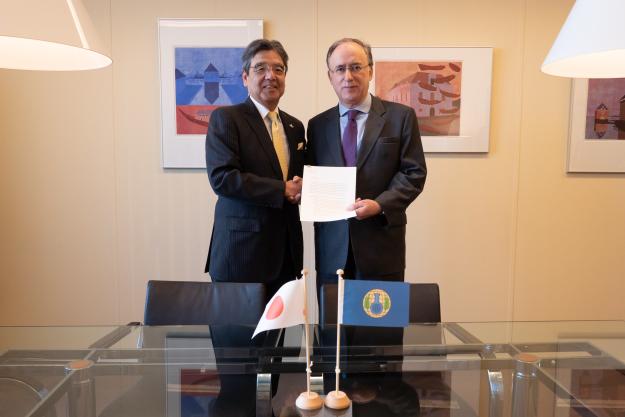
Japan’s Permanent Representative to the OPCW, H.E. Ambassador Hiroshi Inomata, and OPCW Director-General, H.E. Mr Fernando Arias
THE HAGUE, Netherlands — 27 February 2019 — The Government of Japan has contributed €2.4 million to a special Organisation for the Prohibition of Chemical Weapons (OPCW) Trust Fund to support the project to upgrade the current OPCW Laboratory and Equipment Store. This project will result in the construction of a new facility, the OPCW Centre for Chemistry and Technology (“ChemTech Centre”).
The donation was formalised today in a ceremony involving the OPCW Director-General, H.E. Mr Fernando Arias, and Japan’s Permanent Representative to the OPCW, H.E. Ambassador Hiroshi Inomata, at OPCW Headquarters in The Hague. Ambassador Inomata announced the Government of Japan decision to contribute €2.4 million to support the project to upgrade the OPCW Chemical Laboratory to a Centre for Chemistry and Technology and remarked: ’’In order to prevent the use and recurrence of chemical weapons, it is essential that cases are investigated through neutral and objective scientific methods and by a fair and impartial international mechanism. Updating the OPCW Laboratory is, in this light, a very meaningful undertaking. We hope that this Centre will develop as a worldwide core facility for increasing expertise on the analysis and verification methods regarding cases where the possible use of chemical weapons might be suspected.’’
Director-General Arias stated, “The Government of Japan has my sincere gratitude for its generous contribution. This project is critical to the OPCW’s ability to respond to new and emerging chemical weapons threats, as well as to Member States’ requests for increased international cooperation and assistance activities. This contribution demonstrates Japan’s commitment to helping the OPCW achieve these objectives.”
Thirteen Member States have contributed or pledged to contribute financially to the project and a considerable amount has already been raised to date. The Director-General has appealed to all OPCW Member States in a position to make voluntary contributions to do so. In making such appeals, he has emphasised that the new ChemTech Centre will be a resource for all States Parties and that, “All contributions, regardless of size, are greatly appreciated”.
Background
The project to build the ChemTech Centre is on-going and seeks to strengthen the OPCW’s capabilities to fully address new and emerging chemical weapons threats, as well as to support capacity building in OPCW Member States. The current OPCW Laboratory and Equipment Store are central to the effectiveness and integrity of the verification regime of the Chemical Weapons Convention, and they also contribute to the OPCW’s capacity-building and international cooperation activities. However, the current facility will soon no longer be fit-for-purpose due to its ageing infrastructure, space constraints, larger workloads, and new missions with new areas of work.
A new facility is required to meet the demands of OPCW Member States for enhanced verification tools, improved detection capabilities and response measures, as well as increased capacity-building activities. The ChemTech Centre will also help the OPCW to keep pace with developments in science and technology and new chemical weapons threats. The OPCW Technical Secretariat is developing a detailed project plan for the construction of the ChemTech Centre, and a Trust Fund for voluntary contributions has been established to secure the required resources for the project.
To date, the following Member States have contributed or pledged to contribute to the project: Algeria, Belgium, Canada, Estonia, France, Italy, Japan, the Netherlands, Poland, the Republic of Korea, Slovakia, Spain and UK.
As the implementing body for the Chemical Weapons Convention, the OPCW, with its 193 Member States, oversees the global endeavour to permanently eliminate chemical weapons. Since the Convention’s entry into force in 1997, with 193 State Parties, it is the most successful disarmament treaty eliminating an entire class of weapons of mass destruction.
Over 96% of all chemical weapon stockpiles declared by possessor States have been destroyed under OPCW verification. For its extensive efforts in eliminating chemical weapons, the OPCW received the 2013 Nobel Peace Prize.
